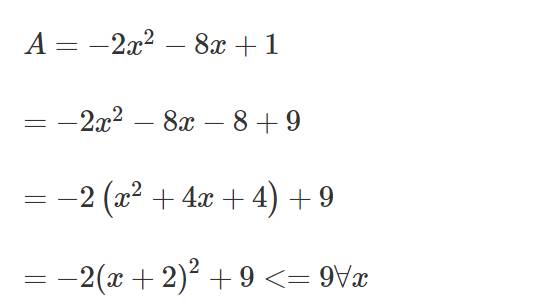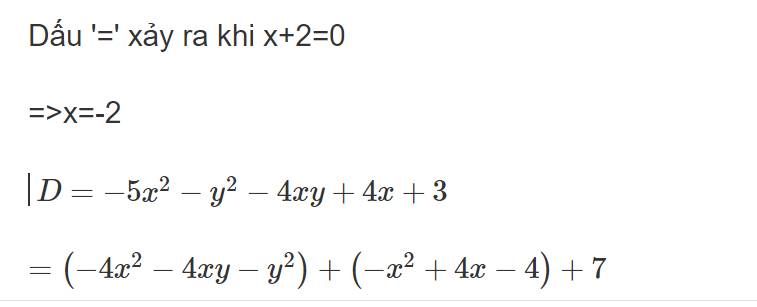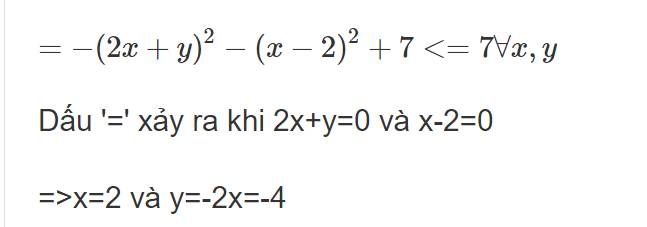Tìm Min hoặc Max
a)2x^2+10x-1
b) 5x - x^2
c) 2x^2-8x-10
d)9x-3x^2
Bài 1 Tìm Min hoặc Max
a)2x^2+10x-1
b) 5x - x^2
c) 2x^2-8x-10
d)9x-3x^2
Bài 2 Phân Tích x^4-2x^3-2x^2-2x-3
Bài 1 Tìm Min hoặc Max
a)2x^2+10x-1
b) 5x - x^2
c) 2x^2-8x-10
d)9x-3x^2
Bài 2 Phân Tích x^4-2x^3-2x^2-2x-3
Tìm max hoặc min của A= -2x^2-8x+1
B=3x^2+3x-1
C=7x-2x^2+3
D=-4xy+4x-y^2-5x^2+3
\(B=3x^2+3x-1\)
\(=3\left(x^2+x-\dfrac{1}{3}\right)\)
\(=3\left(x^2+x+\dfrac{1}{4}-\dfrac{7}{12}\right)\)
\(=3\left(x+\dfrac{1}{2}\right)^2-\dfrac{7}{4}>=-\dfrac{7}{4}\forall x\)
Dấu '=' xảy ra khi x+1/2=0
=>\(x=-\dfrac{1}{2}\)
\(C=-2x^2+7x+3\)
\(=-2\left(x^2-\dfrac{7}{2}x-\dfrac{3}{2}\right)\)
\(=-2\left(x^2-2\cdot x\cdot\dfrac{7}{4}+\dfrac{49}{16}-\dfrac{73}{16}\right)\)
\(=-2\left(x-\dfrac{7}{4}\right)^2+\dfrac{73}{8}< =\dfrac{73}{8}\forall x\)
Dấu '=' xảy ra khi x-7/4=0
=>x=7/4



Bài 1)tìm Min hay Max
a) G=\(\dfrac{2}{x^2+8}\)
b) H=\(\dfrac{-3}{x^2-5x+1}\)
Bài 2) Tìm Min hay Max
a)D=\(\dfrac{2x^2-16x+41}{x^2-8x+22}\)
b)E=\(\dfrac{4x^4-x^2-1}{\left(x^2+1\right)^2}\)
c)G=\(\dfrac{3x^2-12x+10}{x^2-4x+5}\)
1.
\(G=\dfrac{2}{x^2+8}\le\dfrac{2}{8}=\dfrac{1}{4}\)
\(G_{max}=\dfrac{1}{4}\) khi \(x=0\)
\(H=\dfrac{-3}{x^2-5x+1}\) biểu thức này ko có min max
2.
\(D=\dfrac{2x^2-16x+41}{x^2-8x+22}=\dfrac{2\left(x^2-8x+22\right)-3}{x^2-8x+22}=2-\dfrac{3}{\left(x-4\right)^2+6}\ge2-\dfrac{3}{6}=\dfrac{3}{2}\)
\(D_{min}=\dfrac{3}{2}\) khi \(x=4\)
\(E=\dfrac{4x^4-x^2-1}{\left(x^2+1\right)^2}=\dfrac{-\left(x^4+2x^2+1\right)+5x^4+x^2}{\left(x^2+1\right)^2}=-1+\dfrac{5x^4+x^2}{\left(x^2+1\right)^2}\ge-1\)
\(E_{min}=-1\) khi \(x=0\)
\(G=\dfrac{3\left(x^2-4x+5\right)-5}{x^2-4x+5}=3-\dfrac{5}{\left(x-2\right)^2+1}\ge3-\dfrac{5}{1}=-2\)
\(G_{min}=-2\) khi \(x=2\)
: Tìm x, biết:
a) 3x( 4x- 1) - 2x(6x- 3 )=30 b) 2x(3-2x) + 2x(2x-1)=15
c) (5x-2)(4x-1) + (10x +3)(2x - 1)=1 d) (x+2) (x+2)- (x -3)(x+1) = 9
e) (4x+1)(6x-3) = 7 + (3x – 2)(8x + 9) g) (10x+2)(4x- 1)- (8x -3)(5x+2) =14
`@` `\text {Ans}`
`\downarrow`
`a)`
`3x(4x-1) - 2x(6x-3) = 30`
`=> 12x^2 - 3x - 12x^2 + 6x = 30`
`=> 3x = 30`
`=> x = 30 \div 3`
`=> x=10`
Vậy, `x=10`
`b)`
`2x(3-2x) + 2x(2x-1) = 15`
`=> 6x- 4x^2 + 4x^2 - 2x = 15`
`=> 4x = 15`
`=> x = 15/4`
Vậy, `x=15/4`
`c)`
`(5x-2)(4x-1) + (10x+3)(2x-1) = 1`
`=> 5x(4x-1) - 2(4x-1) + 10x(2x-1) + 3(2x-1)=1`
`=> 20x^2-5x - 8x + 2 + 20x^2 - 10x +6x - 3 =1`
`=> 40x^2 -17x - 1 = 1`
`d)`
`(x+2)(x+2)-(x-3)(x+1)=9`
`=> x^2 + 2x + 2x + 4 - x^2 - x + 3x + 3=9`
`=> 6x + 7 =9`
`=> 6x = 2`
`=> x=2/6 =1/3`
Vậy, `x=1/3`
`e)`
`(4x+1)(6x-3) = 7 + (3x-2)(8x+9)`
`=> 24x^2 - 12x + 6x - 3 = 7 + (3x-2)(8x+9)`
`=> 24x^2 - 12x + 6x - 3 = 7 + 24x^2 +11x - 18`
`=> 24x^2 - 6x - 3 = 24x^2 + 18x -11`
`=> 24x^2 - 6x - 3 - 24x^2 + 18x + 11 = 0`
`=> 12x +8 = 0`
`=> 12x = -8`
`=> x= -8/12 = -2/3`
Vậy, `x=-2/3`
`g)`
`(10x+2)(4x- 1)- (8x -3)(5x+2) =14`
`=> 40x^2 - 10x + 8x - 2 - 40x^2 - 16x + 15x + 6 = 14`
`=> -3x + 4 =14`
`=> -3x = 10`
`=> x= - 10/3`
Vậy, `x=-10/3`
d) (5x+3) ( 4x-1) +(10x-7) (-2x+3) =27
e)(8x-5) (3x+2) -(12x+7) (2x-1)=17
f) (5x+9) (6x-1) -(2x-3)( 15z+1) = -190
g) 6x(5x+3) + 3x(1-10x) =7
h) (3x-3) (5 -21x) +(7x+4)(9x-5) =44\
i) (x+1)(x+2)(x-5)-x2 (x+8)=27
một đòn bẫy dài một mét .đặt ở đâu để có thể dùng 3600n có thể nâng tảng đá nặng 120kg?
Bài 1 : Phân tích đa thức thành nhân tử
a) 5x^2y-20xy^2
b) 1-8x+16x^2-y^2
c) 4x-4-x^2
d) x^3-2x^2+x-xy^2
e)27-3x^2
f) 2x^2+4x+2-2y^2
Bài 2: tìm x, biết
a) x^2(x-2023)-2023+x=0
b) -x(x-4)+(2x^3-4x^2-9x):x=0
c) x^2+2x-3x-6=0
d) 3x(x-10)-2x+20=0
Bài 1
a) 5x²y - 20xy²
= 5xy(x - 4y)
b) 1 - 8x + 16x² - y²
= (1 - 8x + 16x²) - y²
= (1 - 4x)² - y²
= (1 - 4x - y)(1 - 4x + y)
c) 4x - 4 - x²
= -(x² - 4x + 4)
= -(x - 2)²
d) x³ - 2x² + x - xy²
= x(x² - 2x + 1 - y²)
= x[(x² - 2x+ 1) - y²]
= x[(x - 1)² - y²]
= x(x - 1 - y)(x - 1 + y)
= x(x - y - 1)(x + y - 1)
e) 27 - 3x²
= 3(9 - x²)
= 3(3 - x)(3 + x)
f) 2x² + 4x + 2 - 2y²
= 2(x² + 2x + 1 - y²)
= 2[(x² + 2x + 1) - y²]
= 2[(x + 1)² - y²]
= 2(x + 1 - y)(x + 1 + y)
= 2(x - y + 1)(x + y + 1)
Bài 2:
a: \(x^2\left(x-2023\right)+x-2023=0\)
=>\(\left(x-2023\right)\left(x^2+1\right)=0\)
mà \(x^2+1>=1>0\forall x\)
nên x-2023=0
=>x=2023
b:
ĐKXĐ: x<>0
\(-x\left(x-4\right)+\left(2x^3-4x^2-9x\right):x=0\)
=>\(-x\left(x-4\right)+2x^2-4x-9=0\)
=>\(-x^2+4x+2x^2-4x-9=0\)
=>\(x^2-9=0\)
=>(x-3)(x+3)=0
=>\(\left[{}\begin{matrix}x-3=0\\x+3=0\end{matrix}\right.\Leftrightarrow\left[{}\begin{matrix}x=3\\x=-3\end{matrix}\right.\)
c: \(x^2+2x-3x-6=0\)
=>\(\left(x^2+2x\right)-\left(3x+6\right)=0\)
=>\(x\left(x+2\right)-3\left(x+2\right)=0\)
=>(x+2)(x-3)=0
=>\(\left[{}\begin{matrix}x+2=0\\x-3=0\end{matrix}\right.\Leftrightarrow\left[{}\begin{matrix}x=3\\x=-2\end{matrix}\right.\)
d: 3x(x-10)-2x+20=0
=>\(3x\left(x-10\right)-\left(2x-20\right)=0\)
=>\(3x\left(x-10\right)-2\left(x-10\right)=0\)
=>\(\left(x-10\right)\left(3x-2\right)=0\)
=>\(\left[{}\begin{matrix}x-10=0\\3x-2=0\end{matrix}\right.\Leftrightarrow\left[{}\begin{matrix}x=\dfrac{2}{3}\\x=10\end{matrix}\right.\)
Câu 1:
a: \(5x^2y-20xy^2\)
\(=5xy\cdot x-5xy\cdot4y\)
\(=5xy\left(x-4y\right)\)
b: \(1-8x+16x^2-y^2\)
\(=\left(16x^2-8x+1\right)-y^2\)
\(=\left(4x-1\right)^2-y^2\)
\(=\left(4x-1-y\right)\left(4x-1+y\right)\)
c: \(4x-4-x^2\)
\(=-\left(x^2-4x+4\right)\)
\(=-\left(x-2\right)^2\)
d: \(x^3-2x^2+x-xy^2\)
\(=x\left(x^2-2x+1-y^2\right)\)
\(=x\left[\left(x^2-2x+1\right)-y^2\right]\)
\(=x\left[\left(x-1\right)^2-y^2\right]\)
\(=x\left(x-1-y\right)\left(x-1+y\right)\)
e: \(27-3x^2\)
\(=3\left(9-x^2\right)\)
\(=3\left(3-x\right)\left(3+x\right)\)
f: \(2x^2+4x+2-2y^2\)
\(=2\left(x^2+2x+1-y^2\right)\)
\(=2\left[\left(x^2+2x+1\right)-y^2\right]\)
\(=2\left[\left(x+1\right)^2-y^2\right]\)
\(=2\left(x+1+y\right)\left(x+1-y\right)\)
Bài 2
a) x²(x - 2023) - 2023 + x = 0
x²(x - 2023) - (x - 2023) = 0
(x - 2023)(x² - 1) = 0
x - 2023 = 0 hoặc x² - 1 = 0
*) x - 2023 = 0
x = 2023
*) x² - 1 = 0
x² = 1
x = 1 hoặc x = -1
Vậy x = -1; x = 1; x = 2023
b) -x(x - 4) + (2x³ - 4x² - 9x) : x = 0
-x² + 4x + 2x² - 4x - 9 = 0
x² - 9 = 0
x² = 9
x = 3 hoặc x = -3
Vậy x = 3; x = -3
c) x² + 2x - 3x - 6 = 0
(x² + 2x) - (3x + 6) = 0
x(x + 2) - 3(x + 2) = 0
(x + 2)(x - 3) = 0
x + 2 = 0 hoặc x - 3 = 0
*) x + 2 = 0
x = -2
*) x - 3 = 0
x = 3
Vậy x = -2; x = 3
d) 3x(x - 10) - 2x + 20 = 0
3x(x - 10) - (2x - 20) = 0
3x(x - 10) - 2(x - 10) = 0
(x - 10)(3x - 2) = 0
x - 10 = 0 hoặc 3x - 2 = 0
*) x - 10 = 0
x = 10
*) 3x - 2 = 0
3x = 2
x = 2/3
Vậy x = 2/3; x = 10
x+2x+3x+3x+4x+5x+6x+7x+8x+9x+10x=-165.tim x
X*(1+2+3+4+5+6+7+8+9+10)=-165
X*55=-165
X=-165/55=-3
111111111111111111111111111111111111111111111111111111111111111111111111111111111111111
(1x + 9x) + (2x + 8x) + (3x + 7x) + (4x + 6x) + 5x + 10x = -165
10x^6 + 5x = -165
= 65x (-165)
= -100
tìm MIN của
B=x^2-6x +1
C=2x^2-10x+1
D=x^2+10x-25
tìm MAX của
B=5x-x^2
C=-x^2-6x+10
D=-2x^2+8x+12
B=(x^2-6x+9)-8
B=(x-3)^2-8
Vì (x-3)^2\(\ge0\forall x\)
-> (x-3)-8\(\ge-8\forall x\)
Dấu = xảy ra<=> x-3=0<=>x=3
C=2x^2-10x+1
C=2(x^2-5x+6,25)-11,5
C= 2(x-2,5)^2-11,5
Vì 2(x-2,5)^2\(\ge0\forall x\)
->2(x-2,5)^2-11,5\(\ge-11,5\forall x\)
Dấu = xẩy ra<=> x-2,5=0<=>x=2,5
Vậy Min C là -11,5 <=> x=2,5
D= x^2+10-25
D=(x^2+10+25)-50
D=(x+5)^2-50
Vì (x-5)^2 \(\ge0\forall x\)
-> (x-5)^2-50\(\ge-50\forall x\)
Dấu = xẩy ra <=> x-5=0<=>x=5
Vậy Min D là -50 <=>x=5
Tìm Max
B= 5x-x^2
B=-(x^2-5x+25/4)-25/4
B= -(x-5/2)^2-25/4
Vì -(x-5/2)^2\(\le0\forall x\)
-> -(x-5/2)^2-25/4\(\le\)-25/4
Dấu = xẩy ra <=> x-5/2=0<=>x=5/2
Vậy Max B là -25/4 <=> x=5/2
C=-x^2-6x+10
C=-(x^2+6x+9)+19
C= -(x+3)^2+19
Vì -(x+3)^2\(\le\)0
=> -(x+3)^2+19\(\le\)19
Dấu = xảy ra <=> x+3=0<=>x=-3
D= -2x^x+8x+12
D=-2(x^2-4x+4)+20
D=-2(x-2)^2 +20
Vì -2(x-2)^2\(\le\)0
=> -2(x-2)^2+20\(\le\)20
Dấu= xẩy ra<=> x-2=0<=>x=2
Vậy Max D là 20<=>x-2